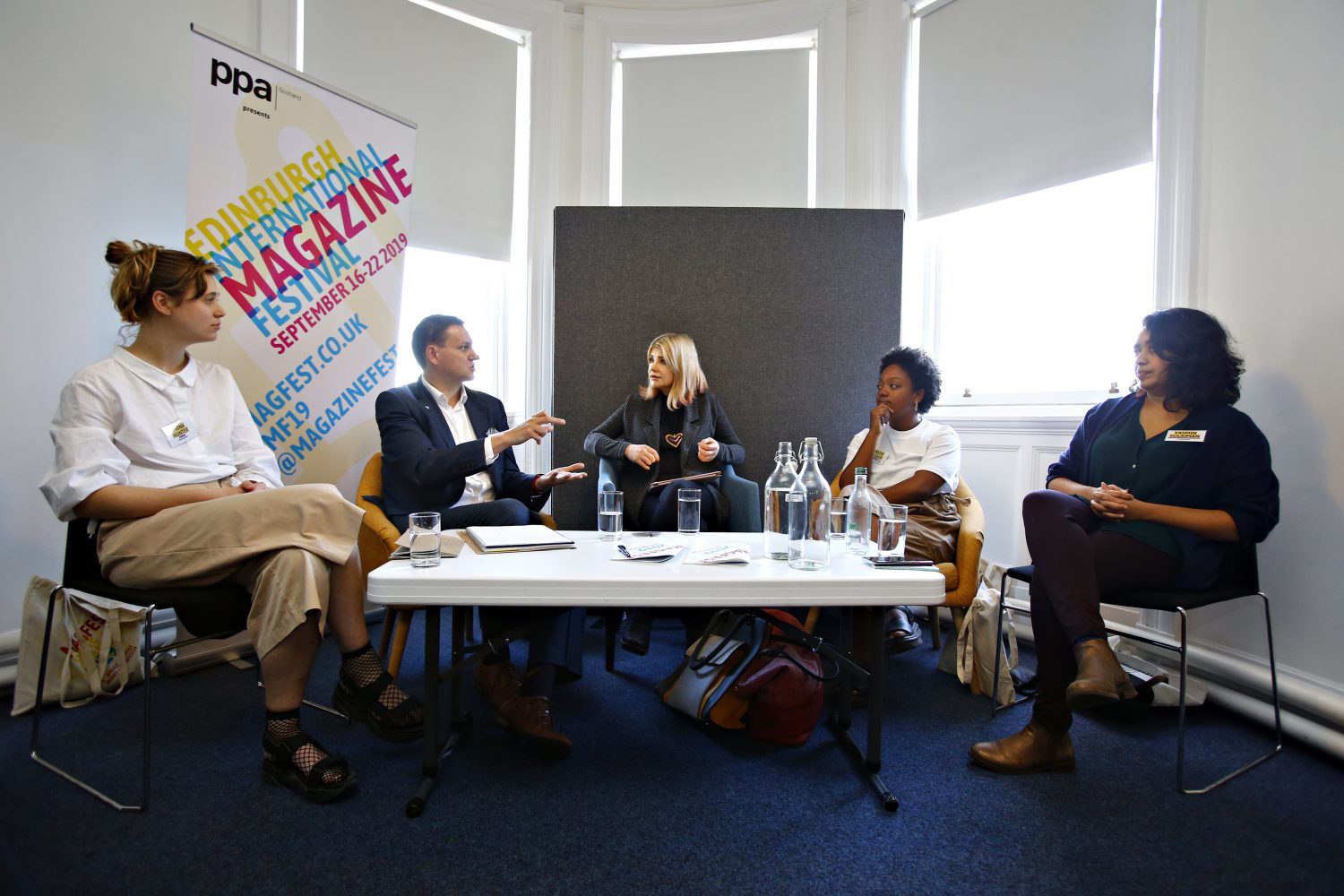This year Magfest was part of the first Edinburgh International Magazine Festival (EIMF) – a full week of magazine events aimed at both industry and consumers. Kudos to Laura Dunlop from our Strategic Partners PPA Scotland for coordinating the week, as well as delivering Magfest itself, which was the usual fantastic mix of inspiration, learning and fun.
The International Magazine Centre held an event as part of the EIMF too – One Night at Waterstones: three amazing magazines, three incredible interviews. Check out the photos from the night on our Events page and look out for the videos coming soon.
As part of Magfest we attended the ‘How can freelancers survive and thrive?’ session, with tips from creative freelancers in all walks of life. We took a lot from the session.

Finding the work in the first place
- Tailor your portfolio to the company and do your homework on them, their publications and what they’re looking for
- Take advantage of all your opportunities – if something doesn’t quite fit with what you had imagined yourself doing, be flexible, try different things, you might find you’re good at it
- Keep at the forefront of the client’s mind and let them know you’re available – you may come across as too busy if you don’t
- Find a commonality with your client
Building your reputation and brand
- Tailor your pitches to the client and don’t give them a reason to say no
- Submit the correct word count and before the deadline – a publisher strapped for time (as all publishers are) will appreciate it and remember you
- Sell yourself on the specifics of what you’re good at – not a Music Writer, but a Scottish Emo Music Writer
- Give yourself a cool sounding title and use creative ways to stick in people’s minds
- Position yourself as an expert over social – focus on what you want to write about, your passions. The more you focus on what interests you, the nicer your life will be, and the better your pieces will be
- Keep an eye out on social for call outs for articles and freelancers
- Pitch to publications that are not as well known
- Your job is to make your boss look good – think about one stage further up the ladder
- Ask for testimonials from happy clients
Networking and being brave
- A lot of freelance work is found through word of mouth, so join a community of like-minded individuals, attend events and be brave
- Introverts – if you hate the idea of networking, tell yourself that you’ll stay for 20 minutes and see how you feel – you might make great connections in that time and find the confidence to stay longer
- People are more likely to reply to an email if they’ve met you
- Make sure you have business cards or small postcards with examples of your work. No business cards? Connect on LinkedIn and send them a message after the event
Managing priorities and your time
- Create three to-do lists with varying priorities
- Be realistic about your capabilities, don’t take on too much if you don’t have time
- If you’re struggling, ask for another couple of days – the worst they can say is no and they may have given you a fake deadline to allow for a late submission anyway. Most publishers would prefer you to ask than to submit late and make them worry
- Share workload with a freelancer friend – someone you trust – so that if you’re struggling to cover two things at once they can help you, and vice versa. Creating a small Code of Conduct can ensure you’re on the same page
- Factor in extra time for admin/travel/meetings e.g. 10% extra or two extra days
- Taking on shift work can be fun if you’re not confident pitching and offers less sole working if you’re new to freelancing
Money and how to talk about it
- A fantastic resource for freelancers in the UK is www.Journoresources.org.uk – check out their freelance rates page for the NUJ’s recommendations
- Ask friends how much they get paid
- Unpaid work – find out who is getting paid. Sometimes nobody’s being paid, including your employer, but sometimes you might be the only mug
- If you’re work for free and the employer is taking advantage of this, discuss it with them – ‘I have done x number of articles for free for you, any more I need to be paid’
- Give your rate and then stop talking. Wait and listen.
- Ask yourself – can you afford to do underpaid work?
- Factor in wait times for being paid, but don’t be afraid to chase up if an invoice remains unpaid
- Give a discount if paid in 14 days or full rate in 28 days, e.g. 4% discount, add on a percentage increase if you still haven’t been paid after 30 days
- Don’t use the phrase ‘I was just wondering if…’ Use ‘When will I be paid and how much’ – this was by far the most controversial statement of the session!
- Remove every word that doesn’t add anything to the sentence – in general, not just with regard to money
- Confirm what you have agreed before starting the work – just to confirm what we said on the phone, we agreed I’d do this and this is how much you’d pay me
- If the worst happens (in the UK) Thomas Higgins will send a legal letter for £10
